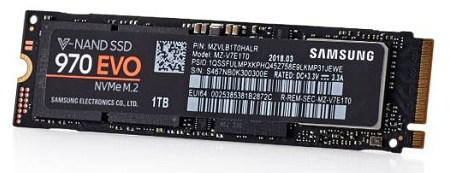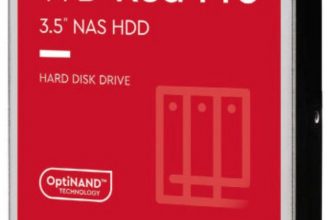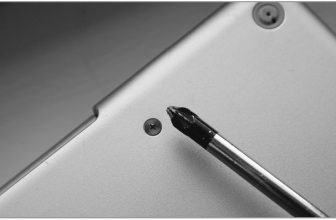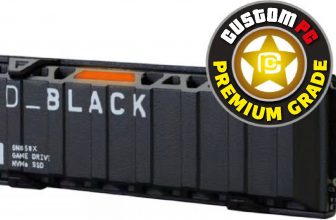Samsung 970 Evo 1TB Review

Samsung 970 Evo 1TB Review – Samsung’s latest reveals the limitations of NAND memory generation after generation, Samsung’s SSDs are the gold standard in solid-state drives. Fully 18 months from launch, its existing 960 Evo and Pro remain among the best in the business. OK, Intel has shaken things up in terms of response times and random access performance with its Optane drives. And Western Digital’s WD Black has presented Samsung with stiffer competition for its Evo drives of late. But Samsung remains the brand to beat. It is nothing short of relentless.

Enter Samsung’s latest, the 970 Evo, tested here in 1TB configuration. As an Evo drive, it’s the value alternative to the 970 Pro’s premium proposition. Everything is relative, of course. The 1TB 970 Evo clocks, so it’s hardly cheap in outright terms. It’s also very expensive next to. say, a basic but decent 2.5-inch SATA SSD of similar capacity from a big brand, such as the Crucial MX500. That can be had for less than half the money.
This, however, is an M.2 drive and operates on a completely different level from any SATA SSD. Spec-wise, the 970 Evo gets all of Samsung’s latest hardware. The main NAND flash memory is Samsung’s 64-layer 256Gb 3D TLC, to which Samsung adds fully 6GB of dedicated SLC write cache. A further 18GB of main memory can be dynamically allocated to SLC mode for caching purposes. The form factor, meanwhile, is the popular 2280 variant of the M.2 standard, and the controller is Samsung’s new Phoenix chipset. As is often the case with Samsung’s controller technology, few details regarding the inner workings of Phoenix have emerged.
What we can say is that the 970 Evo supports the 1.3 iteration of the SSD- optimized NVMe control protocol, and connects to motherboard chipsets via a quad-lane PCIe 3.0 interface. The upshot involves some predictably impressive claimed capabilities. Peak read speed is rated at 3.4GB/s. As for writes, where the SLC write cache is in full operation, peak speeds of 2.5GB/s are possible with this 1TB model. Exhaust the cache, however, and writes drop to 1.2GB/s.
You could argue that the cache-enabled 2.5GB/s write capability is misleading. But Samsung does at least distinguish between cache-accelerated write speed and the drive’s core performance. Whatever, just as impressive on paper is the 970 Evo’s 4K performance. QD128 reads are rated at 500,000 I0PS, while QD128 writes aren’t far behind at 450,000 I0PS. All told, the drive is good for 600TB of writes, and that’s backed by a five-year warranty.
So, how does it perform in the real world? Peak speeds are pretty close to the claims. Sequential reads in ATTO Disk Benchmark hit just under 3.2GB/s, while writes are bang on target at 2.5GB/s. The slightly more realistic CrystalDiskMark pegs the reads back to 2.9GB/s, but writes maintain the 2.5GB/s figure, indicating that the benchmark doesn’t fully tap out the 970 Evo’s 6GB of SLC cache.
Most impressive of all is the 970 Evo’s performance in our 30GB internal file copy test. It tears through the data in just 32 seconds. Less stellar, in context, are the 970 Evo’s 4K random access numbers in CrystalDiskMark: 68MB/s for reads and 171MB/s for writes. Not exactly slouchy, but such figures don’t represent much, if any, progress over the previous generation.
Indeed, that last sentiment arguably holds for the 970 Evo generally. It’s awfully quick for what is ostensibly a mainstream M.2 drive, albeit not a particularly cheap one. But we also sense it’s beginning to bump up against its inherent technological limitations, be that a quad-lane PCIe interface or NAND flash memory. It will take a new paradigm, a revolutionary new approach, or a new technology, like Intel’s Optane tech, to really move the game on. But in terms of mainstream NAND-based SSD technology, this is about as good as it gets and, indeed, probably also as good as it’s going to get. jeremy laird
When you purchase through links on our site, I may earn an affiliate commission. Here’s how it works.
Samsung 970 Evo 1TB Review: BENCHMARKS
| Samsung 970 Evo 1TB | Samsung 970 Evo 250GB | Samsung 960 Evo 250GB | |
| 30GB Internal Copy (Seconds) | 31 | 76 | 89 |
| ATTO Sequential Read (MB/s) | 3,122 | 3,314 | 3,019 |
| ATTO Sequential Write (MB/s) | 2,531 | 1,541 | 1,494 |
| CrystalDiskMark Sequential Read (MB/s) | 2,911 | 2,833 | 1,682 |
| CrystalDiskMark Sequential Write (MB/s) | 2,495 | 1,525 | 1,475 |
| CrystalDiskMark 4K Read (MB/sl | 68 | 67 | 64 |
| CrystalDiskMark 4K Write (MB/sl | 171 | 172 | 191 |
Best scores are in bold. Our test bench consists of an Intel Core i7-8700K, an Asus Maximus X Hero, an Nvidia GeForce GTX 1080, 16GB of Corsair Dominator Platinum DDR4, and a Samsung 850 Evo 250GB OS SSD.
Samsung 970 Evo 1TB Review: SPECIFICATIONS
| Capacity | 1TB |
| Interface | PCI Express |
| Control Protocol | NVMe 1.3 |
| Controller | Samsung Phoenix |
| NAND Type | 64-layer 3D TLC |
| Sequential Read/ Write | 3,4/2.5GB/S |
| Read/Write I0PS | 500K/450K IOPS |
| Warranty | Five years |








